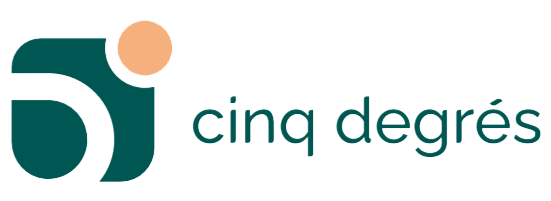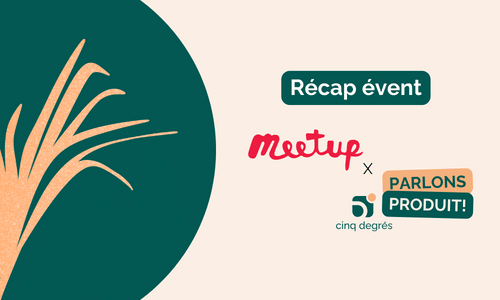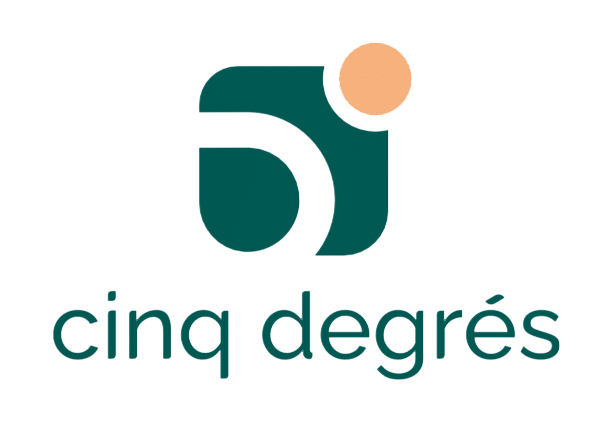On Thursday, April 4, 2024 we hosted the very first 5 Degrés " Let's Talk Product" Meet-Up in our Toulouse offices , and we're going to tell you all about it!
Context of the event "Let's talk product
After almost 3 years in business in Toulouse, we wanted to offer our customers and prospects a slightly different opportunity to get together and discuss their issues. The goal was to get away from the daily grind and talk together on topical issues.
For this "Let's Talk Product" Meet-Up, we proposed 2 themes for the evening: " Organisation Produit VS. Project Organization" in Talk / Conference format, and " Data Product and Data as a Product " in Round Table format. We chose these 2 themes because they are both topical and, above all, echo the expertise we are developing within 5 Degrés.
Product Organization VS. Project Organization
Florian's contribution
Florian Labadens, Senior VP Product at Zenchef, former Head of Tech Excellence at ManoMano and Senior Agile Coach at Airbus (Guest)
Florian began his talk by going back over the history of Agility from its beginnings to the Product, proposing 4 major trends, summarized a little simplistically here:
- Agility at a team level
- Multi-team, company-wide agility
- The arrival of Product V1, which refocuses on the user, emphasizing market and user discovery.
- The "V2" product organization, which focuses on balancing user impact and business impact by strengthening cross-functional collaboration and the use of data.
He went on to discuss why we need to beef up our Product organizations, stressing the importance - especially at a time when "profitability" is in all the slides - of adopting investment strategies that maximize value for users while serving the company's interests.
Florian has chosen to talk about 3 major principles that bind together the concepts of "Product Strategy", "Product Discovery " and "Product Delivery ", without forgetting what is the strength of a Product organization, its Product culture:
- Outputs VS. Outcomes VS. Impacts: "You get what you measure", so it's more than essential to measure outcomes much more.
- Product team VS. Feature team VS. Project team: the responsibility of the Product team from opportunity selection to measuring what the user does with our Product.
- Time-to-market VS. Time-to-money: as a complement to the famous time-to-market, we urgently need to measure the moment when we have a return on investment, as this is ultimately what users and the organization expect.
What we remember:
Agility has created a first level of foundations in R&D organizations, which must now continue to evolve to put the Product at the heart of their business success.
Adopting a Product organization means aiming for competitiveness and profitability by adapting to the market and their users, with autonomous teams working with a data-driven strategy.
To start this metamorphosis :
- Measure the real impact of your products, starting with a Net Promoter Score- you might be surprised!
- Allow an initial team to become truly Empowered by first allowing them to challenge the "why" of each feature. Try a Discovery approach.
- Ask us for an audit or diagnosis to understand your areas for improvement.
We are convinced that by adopting these principles, companies can succeed in creating successful Products and continue to prosper in an ever-changing competitive environment.
-
Sébastien's contribution
Sébastien Rambaud, Practice Leader Product Management at 5 Degrés
Sébastien was keen to share his experience as a Product Manager Consultant at this "Let's Talk Product" Meet-up, highlighting the added value of 5 Degrés and our approach / support "towards a Product Organization".
For him, 5 Degrés' expertise is focused on the operational and strategic transformation of our customers' Product Management. This transformation is deployed through a series of targeted missions, designed to fully integrate the principles of Product Management into the DNA of the client organization.
In particular, he spoke of our mission: "[...] to guide our customers through every stage of their Product lifecycle, instilling a transition to a fully Product Management-oriented organization, all rooted in our credo of transformation through operations. In addition, the integration of a member of our community of experts / Practices, aims to raise the level of mastery of each customer team. Through events, training and experience sharing, we establish regular rituals for resolving company-specific issues and progressing together towards product evolution."
We then focused on our diagnostic approach, which you can find on this link.
Finally, a concrete example of support brought his speech to a close: " In collaboration with one of our customers, we strengthened a team comprising Web Developers and a Project Manager. We highlighted operating modes to be optimized, and established solutions co-constructed with end-users, while refining the delivery process for better adoption and impact. In short, 5 Degrés' coaching is an iterative process of improvement and adjustment, encompassing individual skills and organizational structure, to instill dynamic, responsive Product management."
What we remember:
5 Degrés is committed to transforming its customers' product management from start to finish, through an operational and iterative approach focused on 3 key areas: reinforcing, diagnosing and evolving. In 2 years, we have successfully transformed a customer's Product approach, clarifying vision, establishing OKRs, and implementing a collaborative discovery process, optimizing delivery to measure real impact and improve Product adoption.
In short, 5 Degrés' mission is to help companies move towards high-performance Product culture, by aligning teams and strategies, optimizing processes for greater user satisfaction, and always aiming for greater business impact and organizational efficiency.
Data Product and Data as a Product
Round table
Moderated by Amine Madad, Data Scientist Consultant at 5 Degrés.
100% 5 Degrés guests: Malik Gueye, Data Engineer, Florent Cochonat, Practice Leader Product Management and Romain Moreno, Practice Leader Product Design.
The "Let's Talk Product" round table kicked off with an interactive activity. Using a QR Code, participants were able to generate a word cloud around the concepts of Data Product and Data as a Product. The question asked: What words would you use to define these 2 concepts?
This introduced the second part of the round table, where our 5 Degrees guests were able to share their experiences and discuss the nuance between these 2 concepts.
Excerpt from some of the questions asked:
- Can you tell us more about these two concepts, Data Product and Data as a Product?
Malick: " Data Product refers to a Product or service built around data, while Data as a Product refers to the treatment of data itself as an asset with intrinsic value that can be bought, sold or traded .There are similarities between the two concepts, such as the exploitation of data to create value, and the need for data governance as well."
- How is the user experience (UX) taken into account when creating a Data Product vs. a classic Product?
Florian and Romain: " Creating a Data Product is no different from creating a classic Product. You don't get into data just because it's trendy. When you say 'I want to do AI' or 'I want to do blockchain', you have to ask yourself why? Just as when creating a classic Product, you have to ask yourself: "What positive change(s) will my Product bring about?". The approach is similar. If you ask Chat GPT what a Data Product is for, here's his answer: "To get instant answers, to find creative inspiration, to learn something new. Save time". So yes, the Data Product will surely have several technical dimensions of its own, such as the algorithm/technology behind the Product, or the characteristics of the tool used to access the results (SaaS tool, for example), but overall, the recommendation is to think of it exactly like a classic Product."
What we remember:
To set up a Data Product, here are a few key points to bear in mind:
- Consider it as a classic product, first generic then specific over time. Why not break it down by functional product over time?
- Integrate users directly.
- Long-term view: from the delivery of finished products to the delivery of tools/platforms to create these products.
- In more traditional organizations, where data is revolutionary, integrate "operational" applications into the process. The data team must be a team like any other, with its links and dependencies with other applications.
After these fascinating sessions, we extended the discussions over a friendly networking drink.
Conclusion
The first "Let's Talk Product" meet-up in Toulouse was a real success. The quality of the presentations, the rich exchanges and the friendliness throughout the evening left a lasting impression.
We're looking forward to building on this momentum and bringing you future events.
Recap sheets "Product Talk
Would you like to keep our recommendations close at hand?
Download our summary sheets here.







